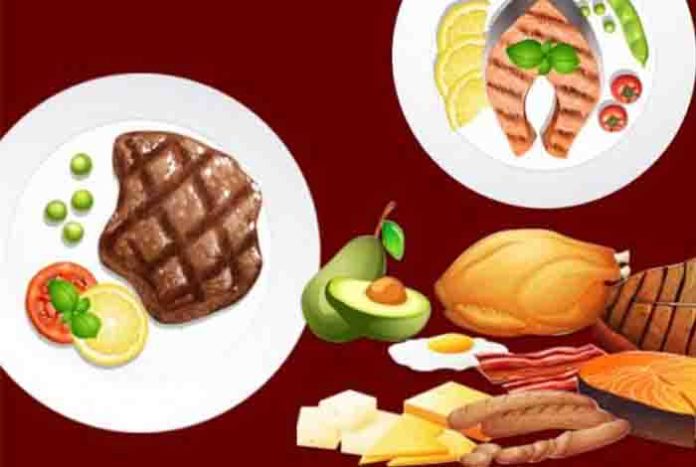
A keto diet is popularly known for being a low carbohydrate or low carb diet where the body uses fats as energy source. This diet is extremely popular and has surpassed diet trends. Every other person struggling to lose weight resorts to a keto diet. Keto is short for a “ketogenic diet” and people who are not so much into wellness are also giving it a shot. Still feel hazy on the details of a keto diet? Don’t worry! We’ve got you covered.
A review at The National Center for Biotechnology Information (NCBI)[1] reveals that ketogenic diet has various health benefits. It is effective enough to reduce weight and normalize Body Mass Index (BMI) of obese people.
Scott Keatley, dietician at Keatley Medical Nutrition Therapy, New York, states that keto diet is all about lowering your carbohydrate intake and increasing your fat consumption, to make your body use fats as a source of energy. While everyone has different nutritional requirements, a person on ketogenic diet should get round 65 to 70% of calories from fats, 15 to 30% from proteins and a meager 5 to 10% of calories from carbohydrates.
Dr. Beth Warren, founder of Beth Warren Nutrition, says that after following this eating routine for two to seven days, the body will be depleted of carbs and enter into a state where it produces ketones (organic compounds) and uses them as energy source. This state is known as ketosis.
How Did the Keto Diet Become Extremely Popular for Weight Loss?
It was specifically designed for people with seizure disorders, according to Jessica Cording, a New York-based dietician. This can be contributed to the production of ketones and another chemical produced known as decanoic acid. Both these might help in minimizing seizures.
People who followed the keto diet started noticing weight loss. There are several reasons as to why one loses weight while being on a ketogenic diet. When you eat carbs, your body retains water to store carbs. When you limit your daily carbohydrate intake as recommended in keto diet, you start losing that water weight. It is also relatively easy to go overboard with carbohydrates, but fats can keep you satiated and fuller for long. Fats also curb cravings and make you stick to this diet easily. Ketosis encourages your body to use fats as a fuel source thereby ensuring a dramatic weight loss.[2]
Keatley explains that keto diet became this popular as every one of us wants to lose some fat from some or other body part and this diet makes our body “a fat burning machine”.
What to Expect from a Keto Diet?
It generally takes around three to four days, for your body, to enter ketosis because it takes this much time to deplete the glucose stores. Keatley warns that at first you might feel a bit uneasy and uncomfortable on keto diet because of less access to carbs as they are a quick energy source.
All the issues that arise due to carb withdrawal can be referred to as “keto flu”. These include nausea, cramps, mental fog, headaches, diarrhea, and tiredness. The best part is that keto flu doesn’t last longer than a week and that’s probably the time when you will also start noticing amazing results.
Can It Actually Help You Lose Weight?
Probably yes! And there are a few reasons why this happens. Keatley says that people usually reduce their daily calorie intake to 1500 calories as fats and lean protein can make you feel satiated for longer. It takes more energy to burn fats and proteins than spend in burning carbs. This explains why you can lose weight on a ketogenic diet.
How much you weigh, when you start a keto diet matters, but you can easily lose around one to two pounds each week. Few people can lose even more as everybody has different caloric needs. He adds, keto diet is not a miracle fat burning diet and it is still important to keep your calorie intake reasonable. Additionally, you need to do moderate exercises such as cardio daily to aid the weight loss.
What to Eat and What to Avoid on a Keto Diet?
The main aim of keto diet is to keep carbohydrates minimum. You must not eat any refined carbohydrates such as starch (beans, potatoes, legumes), fruits and wheat (bread, cereals, pasta). The exceptions to these carbohydrates are star fruit, avocado and various berries, which can be consumed but in small quantities.
Foods to Avoid:
- Grains: Corn, cereals, wheat, rice, etc.
- Fruits: Bananas, peach, apricots, apples, oranges, etc.
- Sugar: Maple syrup, honey, etc.
- Vegetables: Yams, potatoes, etc.
Foods to Eat:
- Meats: Lamb, beef, fish, chicken, eggs, poultry etc.
- Leafy greens: Kale, spinach, etc.
- Vegetables: Cauliflower, broccoli, etc.
- High-fat dairy products: Cream, cheeses (especially hard cheeses), ghee, butter, etc.
- Nuts/seeds: Walnuts, macadamias, sunflower seeds, etc.
- Sweeteners: Monk fruits, stevia, erythritol
- Fruits: Avocado, raspberries, blackberries, and other berries with low glycemic effects
- Other fat sources: High-fat salad dressing, olive oil, coconut oil, saturated fats, etc.
Remember, a keto diet is very low in carbohydrates, moderate in proteins and high in fats.
For Whom Does a Keto Diet Works Best?
Cording says it is best for people with seizure disorders. If you are not one with seizure disorder, you must not do keto for longer period of time as it is quite hard to stick with.
A keto diet can work wonders for people who really love meat and healthy oils like sunflower oil, olive oil and coconut oil. However, it is both difficult and might have certain health repercussions if you follow a ketogenic diet for longer durations. Certain carbohydrates are absolutely essential and good for us.
If you really want to try ketogenic diet for shorter durations, make sure you are ready with all the information you need. It is advised to consult your doctor before starting a keto diet. While, if you are pregnant or breastfeeding, you should not follow a ketogenic diet or must consult your doctor beforehand.
There are various benefits that come being on a keto diet from weight loss, controlled blood sugar, mental focus, reduced hunger, increased energy levels, to several therapeutic medical applications. It turns our body into a fat burning machine and after a successful keto cycle, you will be better version of yourself (at least apparently).






